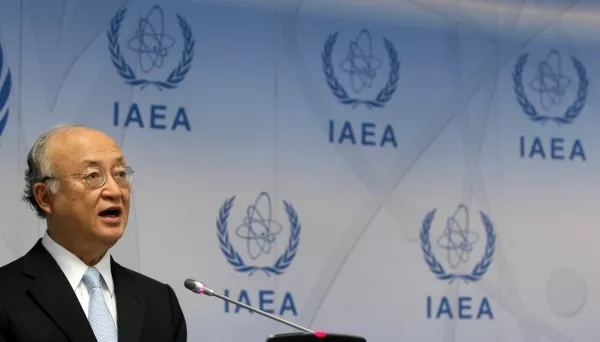Iranian domestic politics
- Tehran is cancelling gasoline subsidies, part of subsidy reduction plan originally prepared in 2010. (AFP, 5/25)
- The government has permitted two new reformist parties to organize – Nedaye Iranian (Voice of Iranians) and Ettehad Mellat Iran (Iranian National Unity) – but reformers are skeptical whether the parties will be allowed to survive as elections draw closer. (Financial Times, 5/25)
US-Iran relations
- President Barack Obama in interview with Israeli Channel 2: “A military solution will not fix it. Even if the United States participates, it would temporarily slow down an Iranian nuclear program but it will not eliminate it…Sanctions won’t do it, a military solution is temporary, the deal we are negotiating will take a nuclear bomb off the table for the next 20 years.” (Times of Israel, 6/2; Yedioth Ahronoth, 6/2; Ha’aretz, 6/1)
Geopolitics and Iran
- In rare public speech, Quds Force Commander Qassem Suleimani accused the US of being complicit in ISIL’s rise and said fighting ISIL is in “our nation’s interest.” (Financial Times, 5/25; Press TV, 5/25; Mehr, 5/25)
- Suleimani: “ISIL is a plague and a major catastrophe…We have to quarantine our borders to safeguard the health of our nation and help our neighbor so that this cancer does not spread into our country.”
- “How is it possible for the US troops to be present in Ramadi under the pretext of supporting Iraqi nation and yet do nothing to stop the killings there? Can this fact mean anything other than their involvement in the conspiracy?”
- Abdolreza Rahmani Fazli, Iran’s interior minister, reiterated that Iran will enforce a 40 km (25 mile) buffer zone along its border with Iraq: “We have previously announced that if Daesh advances to around 40 kilometers of our borders and intends to commit an act of sabotage, Iran will definitely intervene.” (Financial Times, 5/25; Press TV, 5/25
- Note: Iran used enforcement of this exclusion zone as justification for cross-border attacks by its air force in December 2014.
- Iranian military leaders called for new defense spending to counter ISIL threat.
- Brig. Gen. Ahmad-Reza Pourdastan, commander of ground forces: “The Army and the Islamic Revolution Guards Corps (IRGC) Ground Forces should be strengthened so that we can buy tanks, develop our systems and overhaul our helicopters, because today the battle is between the ground troops.” (Fars News, 5/24; Press TV, 5/25) (Financial Times, 5/25)
- Defense Minister Hossein Dehqan: “Like the past we do not have hard threats but rather are faced with soft threats.” (IRNA, 5/26)
- President Hassan Rouhani: “Iranian nation and government will remain at the side of the Syrian nation and government until the end of the road.” (Reuters, 6/2)
Israel
- Reuters cited an Israeli military source, who “reflects thinking at the highest levels of the armed forces,” arguing that nuclear deal with Iran will “allow for the supposition that, in the coming period of years, this is a threat in decline.” (Reuters, 6/4)
- Note: Amos Yadlin, director of the Institute for National Security Studies, argued in April that a nuclear deal with Iran would not diminish Israeli military options if Iran eventually decides to develop a weapon: “Military action against the Iranian nuclear program in 2025 would in all probability not be much more complicated or difficult than in 2015. Before the Iranian nuclear infrastructure is expanded over the duration of the agreement, between 2025 and 2027, the Iranian program will be reduced compared to what it is today, intelligence about it will be better, and it will be less immune than it is at present.” (INSS Insight, 4/27)
- In a visit to Israel, US Chairman of the Joint Chiefs of Staff Martin Dempsey said he agrees with Israel’s assessment that Iran will funnel some sanctions relief into its military and proxies. (AP, 6/9)
- Dempsey: “I share their concern…If the deal is reached and results in sanctions relief, which results in more economic power and more purchasing power for the Iranian regime, it's my expectation that it's not all going to flow into the economy to improve the lot of the average Iranian citizen. I think they will invest in their surrogates; I think they will invest in additional military capability.
- Israeli Energy Minister Yuval Steinitz, visiting Washington, called on US negotiators to “extend talks a third or a fourth time,” which he said was “still better than signing a half-baked agreement.” (Wall Street Journal, 6/5)
- In a separate interview, he said that “Iranians are using delay tactics. It seems they want to come close to the deadline without an agreement… there will be no time to close all the loopholes and clarify all the details. And this will serve the Iranians.” (Politico, 6/5)
- Israeli Prime Minister Benjamin Netanyahu: “I am often portrayed as the nuclear party pooper…But I speak with quite a few of our neighbors, more than you think, and I want to tell you that nobody in this region believes this deal will block Iran's path to the bomb.” (AP, 6/9)
“Red lines,” “points of no return,” and military strikes
- No significant developments.
Uncertain or dubious claims
